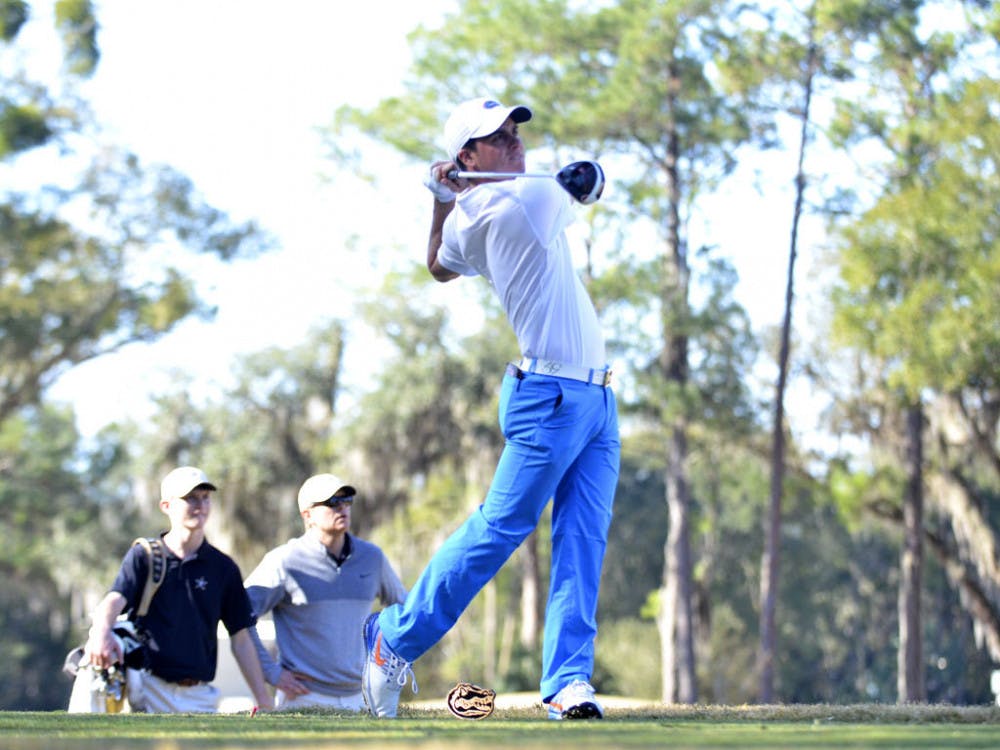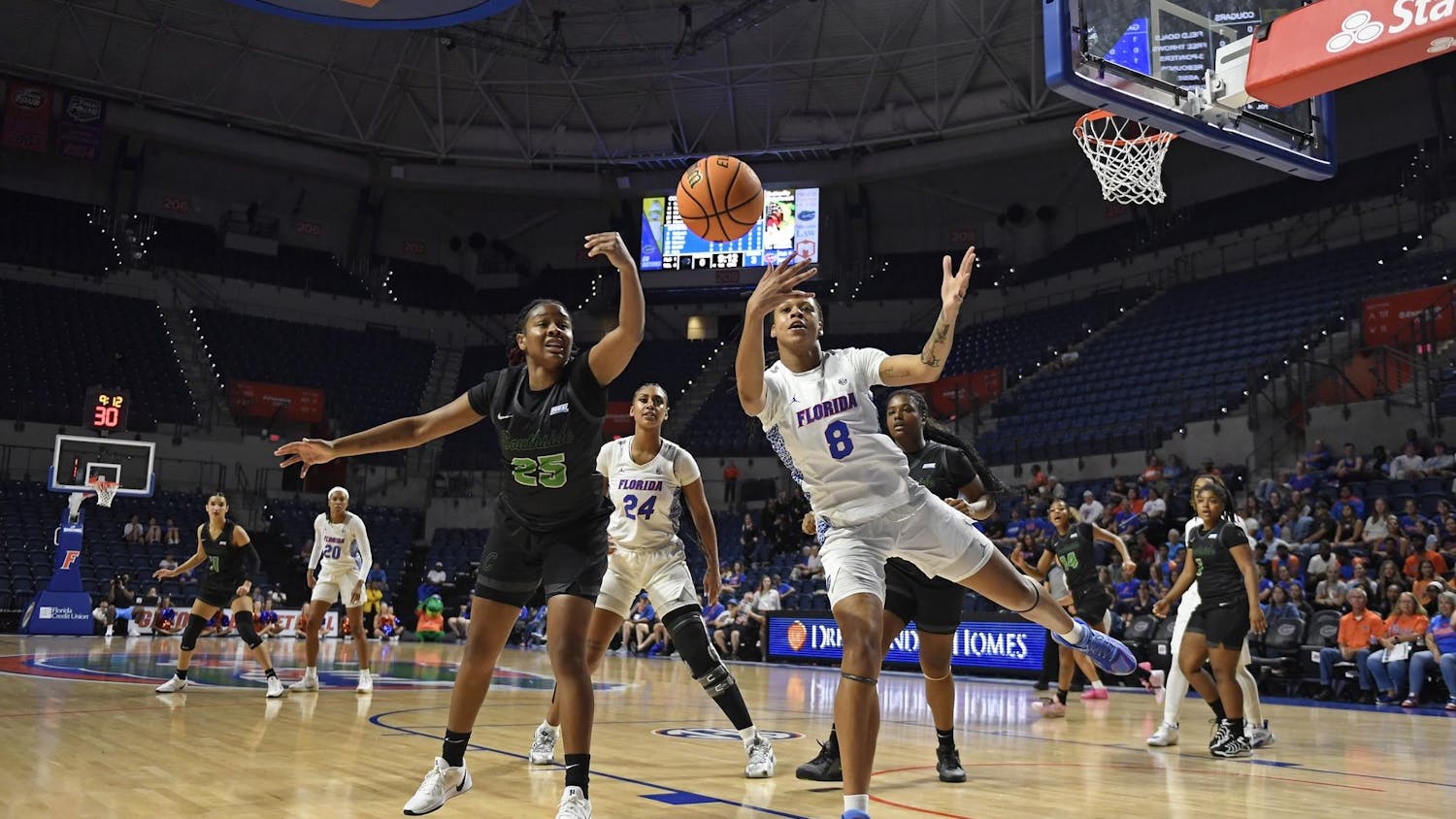Jorge Garcia was always swinging.
It didn’t matter where he was, and he didn’t even need a golf club to do so.
It didn’t matter if he were out in public or at a friends house.
To Garcia, it was always time to work on his game.
"I was always swinging an invisible club everywhere," Garcia said. "At the dinner table, at the mall … It didn’t matter where I was."
Garcia, a member of the Florida men’s golf team, was born in Anaco, Venezuela — a small industrial town in the state of Anzoategui.
Although he’s now starring at one of college golf’s top programs, things weren’t always easy.
Despite hardships, from dealing with the instability in his home country to adjusting to a new life in America, one thing remained constant.
His passion for golf.
"Nothing too fancy"
In a town of only about 100,000 people, Garcia knew almost everyone in his neighborhood.
Throughout the week, people would constantly dart in and out of his house. Friends and family would pop in to have a meal or simply to say hi.
In front of Garcia’s large home sat a well maintained yard where his mother, Sara, would host parties.
Everyone liked him. And everyone knew what he was about — golf.
From the time he could walk, Garcia used to toddle along when his father, Jorge Louis, and older brother, Jorge Andres, would go to the course.
Finally, when Garcia turned 4, his father bought him his first clubs, a set of Snoopy Juniors. Seven clubs in all.
Garcia was instantly smitten.
"I loved them," Garcia said. "I wouldn’t even want to take the wrapper out. They were so good, and it was such a big thing at the moment."
From then on, Garcia took the game seriously.
He worked on his craft for hours on end at his home course, Anaco Country Club, a small, nine-hole course where weeds dotted the fairways like a checkerboard and scuffed-up, second-hand range balls were used for practice.
With the grass sometimes up to his ankles, Garcia would press on, hitting ball after ball, chip after chip and putt after putt in the hot, tropical climate of northeastern Venezuela.
"That’s where I started," Garcia said. "Nothing too fancy."
He soon began competing in and winning various junior tournaments in his hometown and neighboring cities. On occasion, his golfing prowess even took him to the U.S. to play against some of the best young juniors in America.
"I kinda fell in love with the competition of it and how hard it was, and ever since, I just kept playing," Garcia said.
Until one day, when it was all taken away.
"That was kinda the only thing I really loved."
Throughout the early 2000s, then-Venezuelan president Hugo Chavez, who called golf a sport for the rich and privileged, went on a tirade against the golfing industry, closing numerous courses throughout the country, including Anaco Country Club.
For Chavez and his socialist government, golf courses were seen as a stronghold for elitism.
They had to go.
Garcia was 9 at the time.
Gone were the long hours of practice. Gone were the competitions. The golf clubs, which Garcia could seemingly never put down, were set aside with only the hopes of gathering dust.
"That was kinda the only thing I really loved," Garcia said, "and they took that away from me."
So, Garcia turned his attention to other sports. From the age of 9 until the age of 12, Garcia dabbled in soccer, volleyball and basketball. He even played goalie for a local rollerblade hockey team.
And although he had fun, nothing ever came close to matching his love for golf.
The desire to play the sport he loved still burned inside him. The fire remained stoked amidst the unstable politics that tried to quench it.
Three years after the closing of Anaco Country Club, Garcia, then 12, made the decision to leave his family behind and move to the U.S. to pursue a career in golf.
He was going to live in Miami with his aunt Maria Benitez and her two children.
Benitez, who moved to the U.S. from Venezuela in 2003, was Garcia’s mom’s best friend growing up and eventually became Garcia’s godmother.
Papers were filed. Arrangements were made. Everything was set for Garcia to return to the game he loved.
Then came the day it was time to leave Anaco behind.
"I freaked out," Garcia said. "Everything had already been done. All the papers had been filed, and I told my dad, ‘I’m not going.’"
His father wouldn’t listen.
"You already made the decision," he remembers his father telling him. "We had to do so much for you to do this, so now you just gotta get up and do it."
And with that, he left.
"He was just a kid."
Along with his parents, Garcia boarded the plane that would take him from his homeland. Three hours later, he arrived in sunny Miami. Benitez was waiting for him at the airport.
His parents stayed with him the first few days in Miami. When they left to go back to Venezuela, the weight of his reality hit him.
"Every night he’d move to my bed. And I’d come back to his bed with him and stayed with him until he slept," Benitez said. "I knew it was hard for him without the parents … He was just a kid."
Without the support of his parents, Garcia felt lost.
"I feel like the first day where I actually felt alone, it was when they left," Garcia said. "I just remember crying that whole day."
With one chapter of his life closed, another one soon began.
After three long years, Garcia was finally swinging again.
His new home in Doral Isles bordered the famous Doral Golf Course, a regular tournament-stop for the PGA Tour. Jorge was finally free. Free to practice. Free to work. Free to pursue his dreams.
"I left so many things behind," Garcia said. "Friends, family, brother … I left a lot of things behind because this is what I wanna do, and that’s what kinda pushes me sometimes."
He was focused and prepared to be the best he could be. Even amidst frustration, there was no stopping him.
"He was so focused on golf," Benitez said. "He went to practice every day until night … He loved it."
His obsession with the game got to the point where Benitez sometimes feared for his health.
Benitez said she always warned Jorge about the dangers of being out in the sun too long.
But he would always say, "No, I have to practice because if I’m home, someone’s getting better. If I don’t go, they’re going to be better than me."
"He was always trying to push himself to work harder, harder, harder," Benitez said.
And the hard work paid off.
Garcia became one of the top junior golfers in the country. From 2013 on, he was a fixture on leaderboards across junior golf.
His win at the 2013 AJGA Puerto Rico Open earned him an exemption to play in his first PGA Tour event at the 2013 Puerto Rico Open, where he made the cut as a 17-year-old.
Garcia would go on to win the AJGA Thunderbird Invitational in 2013 and the AJGA Taylormade-Adidas Golf Junior in 2014, making him a first-team Rolex Junior All-American in 2013 and 2014.
In 2014, Garcia would fire rounds of 64, 68, 64 and 67 to capture his second Toyota Junior Golf World Cup Championship in a row.
And then came an offer. An offer to play collegiate golf for the University of Florida.
"He had a life that not every kid has."
Garcia was first recruited by then-Florida coach Buddy Alexander.
After visiting UF, Garcia was extended an offer. He would commit to play for the Gators the summer before his sophomore year of high school.
"I didn’t really know how big of a deal it was at the time," Garcia said of his commitment. "I just knew the University of Florida was somewhere where I wanted to play golf."
But things wouldn’t go as planned.
After 27 seasons and two national championships, Alexander retired from coaching at the end of the 2014 Spring season.
In June of that year, Alexander was replaced by J.C. Deacon, a man in his early 30s coming off four seasons as an assistant coach at UNLV.
The first task the rookie head coach was assigned was securing a star-studded incoming class that included Garcia and highly-touted recruits Sam Horsfield and Gordon Neale.
Both Garcia and Horsfield met Deacon at Highlands Reserve, Horsfield’s home course in Davenport.
"We just talked about the future and what they wanted and what I thought the program could be," Deacon said. "Literally within five minutes, we all got along really, really well. It made it really easy."
Now, almost two years later, Garcia has come full circle.
He’s starring on one of golf’s premier college teams and is currently ranked as one of the top-70 collegiate players in the country.
But even with the perks of being a top golfer at a top program, Garcia still thinks back to those days that made him who he is.
He remembers sneaking out on a closed course, hoping security wouldn’t throw him out.
He remembers hitting second-hand range balls for hours on end in ankle-high grass.
He remembers the decision he made and the relationships he forged from it.
And he remembers the time spent with his aunt.
She’s just glad he’s happy and pursuing his dreams.
"Even though he was with me, it was hard for him, and we tried to do our best," Benitez said. "But I think it was not easy. He had a life that not every kid has. And he deserves good things.
"He’s my son."
Contact Ray Boone at rboone@alligator.org and you can follow him on Twitter @rboone1994.
Jorge Garcia tees off during the 2016 SunTrust Gator Invitational at the Mark Bostick Golf Course.






